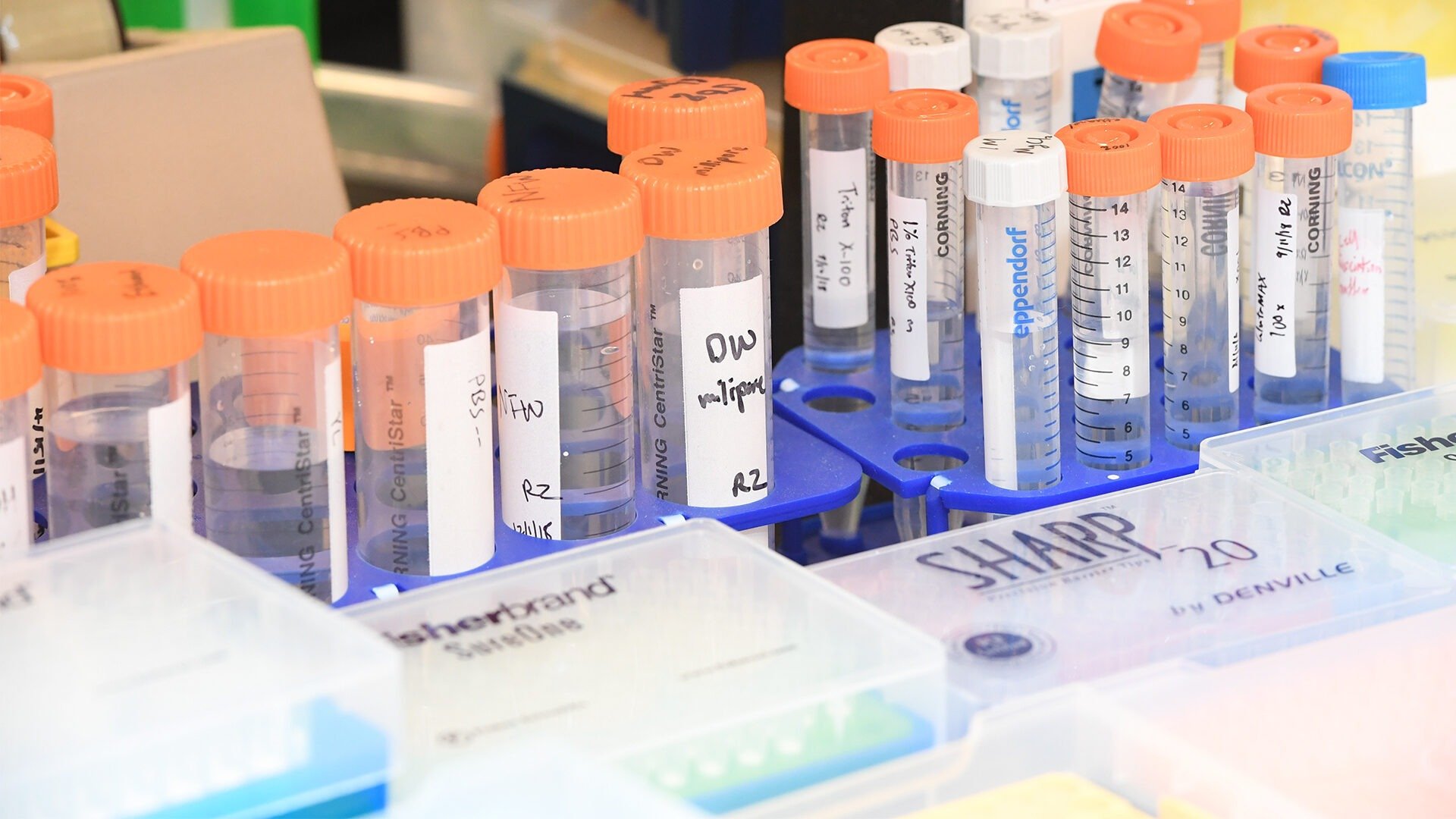Our academic and research programs in Biomedical Data Science center on developing new data analysis technologies in order to understand disease mechanisms and provide improved health care at lower costs.
Our curriculum in Biomedical Data Science trains students to extract knowledge from biomedical datasets of all sizes in order to understand and solve health-related problems. Students collaborate with faculty throughout the schools of Medicine and Engineering to develop novel cloud-based technologies and data analysis methods that will improve our ability to diagnose and treat diseases.
Complete at least 3 credits of field mastery from the following list:
- EN.580.464 Advanced Data Science for Biomedical Engineering
- EN.520.465 Machine Perception
Complete remainder of 18 credits from this list to complete your focus area:
- EN.601.220 Intermediate Programming*
- OR EN.601.226 Data Structures*
- EN.520.412 Machine Learning for Signal Processing
- EN.520.414 Image Process and Analysis I
- EN.520.415 Image Process and Analysis II
- EN.520.439 Machine Learning for Medical Applications
- EN.553.436 Introduction to Data Science
- EN.580.448 Computational Genomics: Data Analysis
- EN.580.428 Genomic Data Visualization
- EN.580.431 Introduction to Computational Medicine: Imaging
- EN.580.433 Introduction to Computational Medicine: The Physiome
- EN.580.447 Computational Stem Cell Biology
- EN.580.458 Computing the Transcriptome
- EN.580.488 Foundations of Computational Biology & Bioinformatics
- EN.580.491 Learning Theory
- EN.580.495 Neural Signals and Computation
- EN.601.315 Databases
- EN.601.350 Introduction to Genomic Research
- EN.601.447 Computational Genomics: Sequences
- EN.601.482 Machine Learning: Deep Learning
- EN.601.475 Machine Learning
- EN.601.490 Introduction to Human-computer Interaction

Computational Medicine aims to advance healthcare by developing computational models of disease, personalizing these models using data from patients, and applying these models to improve the diagnosis and treatment of disease. We are using these patient models to discover novel risk biomarkers, predict disease progression, design optimal treatments, and identify new drug targets for applications such as cancer, cardiovascular disease, and neurological disorders.
Our curriculum in Computational Medicine bridges biology with mathematics, engineering, and computational science. Students develop new solutions in personalized medicine by building computational models of the molecular biology, physiology, and anatomy of human health and disease.
Complete at least 6 credits of field mastery from the following list:
- EN.580.430 Systems Pharmacology & Personalized Medicine
- EN.580.431 Introduction to Computational Medicine: Imaging
- EN.580.433 Introduction to Computational Medicine: The Physiome
- EN.580.447 Computational Stem Cell Biology
- EN.580.464 Advanced Data Science for Biomedical Engineering
Complete remainder of 15 credits from this list to complete your focus area:
- EN.601.220 Intermediate Programming*
- OR EN.601.226 Data Structures*
- EN.520.412 Machine Learning for Signal Processing
- EN.520.432 Medical Imaging Systems
- EN.520.439 Machine Learning for Medical Applications
- EN.520.440 Machine Intelligence on Embedded Systems
- EN.520.465 Machine Perception
- EN.540.433 Pharmacokinetics & Pharmacodynamics
- EN.553.361 Introduction to Optimization
- EN.553.433 Monte Carlo Methods
- EN.553.436 Introduction to Data Science
- EN.553.450 Computational Molecular Medicine
- EN.580.432 Principles of Genomic Systems Engineering and Synthetic Biology
- EN.580.439 Models of the Neuron
- EN.580.448 Computational Genomics: Data Analysis
- EN.580.458 Computing the Transcriptome
- EN.580.488 Foundations of Computational Biology & Bioinformatics
- EN.601.350 Genomic Data Science
- EN.601.447 Computational Genomics: Sequences
- EN.601.455 Computer Integrated Surgery I
- EN.601.456 Computer Integrated Surgery II (also 601.496 Teams)
- EN.601.461 Computer Vision
- EN.601.475 Machine Learning

Genomics & Systems Biology connects the information in our genome and epigenome to the function of biological systems, from cells to tissues and organs. We are developing new computational and experimental methods for systematic analysis of genomes, building models that span length and time scales, and using synthetic biology to design new biomedical systems for human health applications.
Our curriculum spans the fields of engineering, computer science, biology, and biostatistics. Students develop tools to understand the genetic, molecular, and cellular behaviors that cause disease.
Complete at least 6 credits of field mastery from the following list:
- EN.580.448 Computational Genomics: Data Analysis
- EN.580.458 Computing the Transcriptome
- EN.580.483 Annotate a Genome
Complete remainder of 15 credits from this list to complete your focus area:
- EN.601.220 Intermediate Programming*
- OR EN.601.226 Data Structures*
- EN.530.343 Design and Analysis of Dynamical Systems
- EN.530.410 Biomechanics of the Cell
- EN.530.436 Bioinspired Science and Technology
- EN.540.409 Dynamic Modeling and Control
- EN.540.414 Computational Protein Structure Prediction and Design
- EN.553.361 Introduction to Optimization
- EN.553.426 Introduction to Stochastic Processes
- EN.553.436 Intro Data Science
- EN.553.450 Computational Molecular Medicine
- EN.580.428 Genomic Data Visualization
- EN.580.430 Systems Pharmacology and Personalized Medicine
- EN.580.431 Introduction to Computational Medicine: Imaging
- EN.580.432 Principles of Genomic Systems Engineering and Synthetic Biology
- EN.580.433 Introduction to Computational Medicine: The Physiome
- EN.580.447 Computational Stem Cell Biology
- EN.580.464 Advanced Data Science
- EN.580.488 Foundations of Computational Biology & Bioinformatics
- EN.580.491 Learning Theory
- EN.601.350 Introduction to Genomic Research
- EN.601.447 Computational Genomics: Sequences
- EN.601.449 Computational Genomics: Applied Computational Genomics
- EN.601.465 Natural Language Processing
- EN.601.475 Machine Learning
- EN.601.482 Machine Learning: Deep Learning
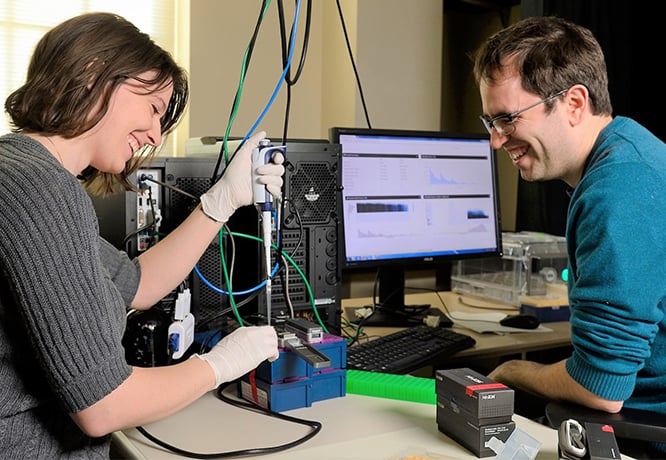
Imaging & Medical Devices involves the measurement of spatial and temporal distributions and signals over scales ranging from molecules and cells to organs and whole populations. Combining mathematics, physics, and biological systems with engineering of new devices and computational algorithms, our academic and research programs in Imaging & Medical Devices center on new technologies and data-intensive analysis, including:
- Imaging Technology: Optical, X-ray, CT, MRI, ultrasound, and molecular imaging
- Image Analysis: Image registration and reconstruction, and extraction of knowledge from image data
- Novel Medical Devices: Broad range of diagnostic and therapeutic devices driven by clinical need.
Our curriculum in Imaging & Medical Devices spans mathematical fundamentals, physics of imaging technologies, device design and development based on clinical needs, and computational techniques for image processing and analysis. In addition to learning about real clinical systems and data types – including hands-on experience – students learn data analysis, modeling, and computer simulation methods.
Complete at least 3 credits of field mastery from the following list A:
- EN.580.463 Physics of Medical Imaging
- EN.510.422 Micro & Nano Structured Materials and Devices
- EN.530.420 Robot Sensors/Actuators
Complete at least 3 credits of field mastery from the following list B:
- EN.520.412 Machine Learning for Signal Processing
- EN.553.436 Intro Data Science
- EN.580.464 Advanced Data Science of Biomedical Engineering
- EN.601.464 Artificial Intelligence
- EN.601.475 Introduction to Machine Learning
Complete remainder of 9 credits from this list to complete your focus area:
- EN.601.220 Intermediate Programming*
- OR EN.540.230 Mastering Electronics*
- OR EN.540.241 Intro to Mechatronics: Sensing, Processing, Learning and Actuation*
- EN.520.344 Digital Signal Processing
- EN.520.427 Design of Advanced Instruments and Systems
- EN.520.432 Medical Imaging Systems
- EN.520.439 Machine Learning for Medical Applications
- EN.520.440 Machine Intelligence on Embedded Systems
- EN.520.448 Electronics Design Laboratory
- EN.520.495 Microfabrication Laboratory
- EN.530.414 Computer-Aided Design
- EN.580.431 Computational Medicine: Imaging
- EN.580.471 Principles of BME Instrumentation
- EN.580.493 Imaging Instrumentation
- EN.601.455 Computer Integrated Surgery I
- EN.601.456 Computer Integrated Surgery II
- EN.601.461 Computer Vision
- EN.601.482 Machine Learning: Deep Learning
- EN.601.490 Introduction to Human-Computer interaction
- EN.601.491 Human-Robot Interaction
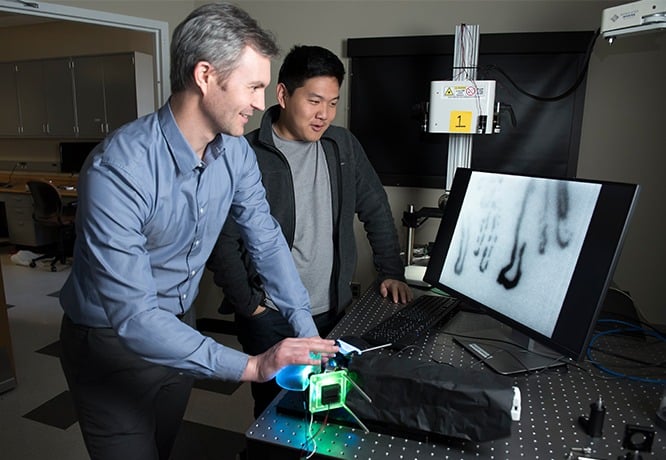
Immunoengineering harnesses the power of the immune system to treat diseases such as cancer and promote tissue regeneration and healing.
Our curriculum trains students in immunoengineering at the molecular, cellular, and systems levels. Particular emphasis is placed on novel materials and methods to harness the body’s immune system to fight disease, and to promote tissue repair and healing. Students develop new biomaterials, vaccines, therapeutics, and systems to understand immune cell function and guide immune cell behavior.
Complete at least 3 credits of field mastery from the following list:
- EN.580.453 Immunoengineering Principles and Applications
- EN.580.420 Immunomodulatory Biomaterials: Design, Synthesis, and Applications
Complete remainder of 18 credits from this list to complete your focus area:
- EN.510.311 Structure of Materials
- EN.510.315 Physical Chemistry of Materials II
- EN.510.407 Biomaterials II: Host response and biomaterials applications
- EN.510.422 Micro and Nano Structured Materials & Devices
- EN.530.436 Bioinspired Science and Technology
- EN.540.303 Transport Phenomena I
- EN.540.304 Transport Phenomena II
- EN.540.403 Colloids and Nanoparticles
- EN.540.414 Computational Protein Structure Prediction and Design
- EN.540.428 Supramolecular Materials and Nanomedicine
- EN.540.465 Engineering Principles of Drug Delivery
- EN.553.413 Applied Statistics and Data Analysis
- EN.553.433 Monte Carlo Methods
- EN.553.436 Introduction to Data Science
- EN.580.427 Microphysiological Systems
- EN.580.430 Systems Pharmacology and Personalized Medicine
- EN.580.441 Cellular Engineering
- EN.580.442 Tissue Engineering
- EN.580.444 Biomedical Applications of Glycoengineering
- EN.580.464 Advanced Biomedical Data Science
- EN.601.451 Introduction to Computational Immunogenomics
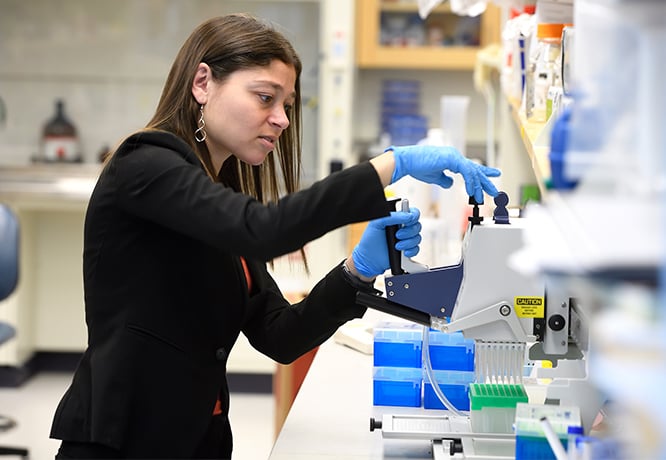
Neuroengineering comprises fundamental, experimental, computational, theoretical, and quantitative research aimed at understanding and augmenting brain function in health and disease across multiple spatiotemporal scales.
Our curriculum in Neuroengineering trains students to develop and apply new technologies to understand and treat neurological disorders. Students build tools to define, control, enhance, or inhibit neural networks in precise spatial and temporal domains.
Complete at least 3 credits of field mastery from the following list:
- EN.520.412 Machine Learning for Signal Processing
- EN.553.436 Intro Data Science
- EN.580.464 Advanced Data Science of Biomedical Engineering
- EN.601.464 Artificial Intelligence
- EN.601.475 Introduction to Machine Learning
Complete remainder of 15 credits from this list to complete your focus area:
- EN.601.220 Intermediate Programming*
- OR EN.601.226 Data Structures*
- EN.520.412 Machine Learning for Signal Processing
- EN.520.432 Medical Imaging Systems
- EN.520.454 Control Systems Design
- EN.520.495 Microfabrication Lab
- EN.530.414 Computer-Aided Design
- EN.580.427 Microphysiological Systems
- EN.580.432 Principles of Genomic Systems Engineering and Synthetic Biology
- EN.580.441 Cellular Engineering
- EN.580.442 Tissue Engineering
- EN.580.471 Biomedical Instrumentation
- EN.580.488 Foundations of Computational Biology & Bioinformatics
- EN.580.491 Learning, Estimation, and Control
- EN.580.493 Imaging Instrumentation
- EN.601.455 Computer Integrated Surgery I
- EN.601.456/496 Computer Integrated Surgery II
- EN.601.475 Machine Learning
- EN.601.482 Machine Learning: Deep Learning
- EN.601.490 Introduction to human-computer interaction
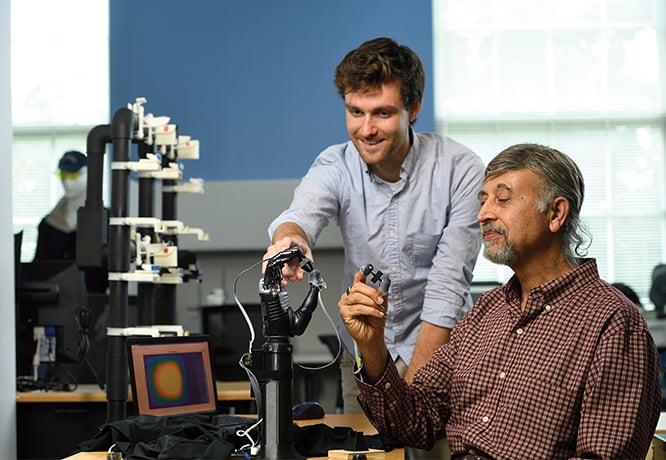
Translational Cell & Tissue Engineering develops and translates advanced technologies to enhance or restore function at the molecular, cellular, and tissue levels. Hopkins BME is leading an effort in translational cell and tissue engineering that bridges discovery, innovation, and translation through basic science, engineering, and clinical endeavors.
Our curriculum spans a variety of novel methods that harness the power of cells, materials, and advanced therapeutics to promote tissue repair and to treat disease. Students develop new techniques and biomaterials to guide cell behavior and reconstruct damaged tissues and organs.
Complete at least 3 credits of field mastery from the following list:
- EN.580.441 Cellular Engineering
- EN.580.442 Tissue Engineering
Complete remainder of 15 credits from this list to complete your focus area:
- EN.510.311 Structure of Materials
- EN.510.313 Mechanical Properties of Materials
- EN.510.316 Biomaterials I
- EN.510.407 Biomaterials II
- EN.520.495 Microfabrication Laboratory
- EN.530.410 Biomechanics: Cells and Organisms
- EN.540.301 Kinetic Processes
- EN.540.303 Transport Phenomena I
- EN.540.304 Transport Phenomena II
- EN.540.306 Chemical and Biological Separations
- EN.540.403 Colloids and Nanoparticles
- EN.540.414 Computational Protein Structure Prediction and Design
- EN.540.426 Fundamentals of Cell Bioengineering
- EN.540.428 Supramolecular Materials and Nanomedicine
- EN.540.460 Polymer Physics
- EN.580.420 Immunomodulatory Biomaterials: Design, Synthesis, and Applications
- EN.580.427 Microphysiological Systems & Laboratory
- EN.580.443 Advanced Orthopaedic Tissue Engineering
- EN.580.444 Biomedical Applications of Glycoengineering
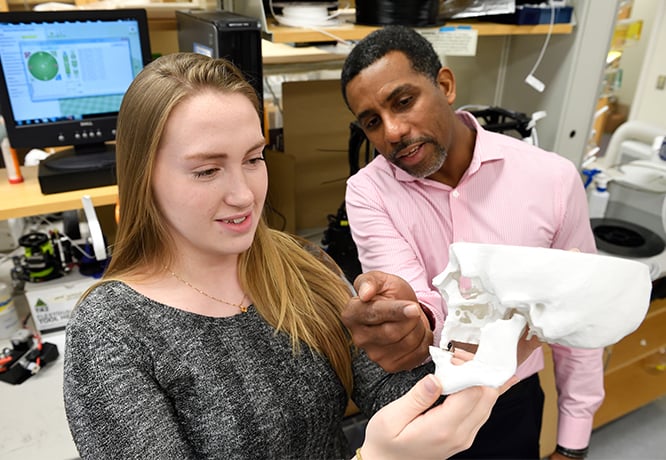
*one of these lower-level courses is permitted in to count towards the focus area degree requirement
Teal text shows courses operated by BME.
Red text shows lower level engineering courses.
